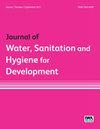城市供水系统的总体绩效评价:以埃塞俄比亚德布雷塔博尔镇为例
IF 1.4
4区 环境科学与生态学
Q3 WATER RESOURCES
Journal of Water Sanitation and Hygiene for Development
Pub Date : 2023-03-23
DOI:10.2166/washdev.2023.157
引用次数: 0
摘要
埃塞俄比亚的城市供水设施,包括Debre Tabor镇,普遍存在供水断断续续、水质问题、服务质量差和其他问题。因此,本研究的主要重点是基于水力效率,质量,成本回收和客户满意度来评估城镇供水系统的实际绩效水平。以可靠性、弹性和脆弱性为性能指标,对配水系统状态进行了评价。采用加权算术水质指数(WAWQI)和住户问卷分别对水质和顾客满意度进行评价。基于压力和速度的可持续性指数分别为0.614和0.132,供水状况为可接受和不可接受,总体可持续性为中等。水质调查结果显示,超过一半的自来水水质欠佳或不适合饮用。从客户那里收取的收入和公用事业的水生产成本的比较表明,只有34.31%的生产成本是由客户承担的。总体而言,62.6%的社会人士对现有供水系统表示不满意。因此,为了提高性能,建议解决所有主要的社会、经济、环境和技术问题。本文章由计算机程序翻译,如有差异,请以英文原文为准。
Overall performance evaluation of an urban water supply system: a case study of Debre Tabor Town in Ethiopia
Urban water utilities in Ethiopia, including Debre Tabor Town, commonly suffer from an intermittent water supply, water quality issues, poor service delivery, and other problems. Thus, the main focus of this study was to evaluate the actual performance level of the water supply system of the town based on hydraulic efficiency, quality, cost recovery and customer satisfaction. The water distribution system status was measured by using reliability, resilience, and vulnerability as performance indicators. Weightage Arithmetic Water Quality Index (WAWQI) and household-based questionnaires were used to evaluate the water quality and customer satisfaction, respectively. Pressure and velocity-based sustainability index of 0.614 and 0.132 showed acceptable and unacceptable water supply status, respectively, and overall moderate sustainability. Results of the WAWQI revealed that more than half of the sampled tap waters were either poor or unfit for drinking purposes. The comparison of income collected from customers and the water production costs of the utility showed that only 34.31% of production cost is covered by customers. Generally, 62.6% of the society confirmed that they are unsatisfied with the existing water supply system. Thus, to improve the performance, it is recommended to address all the major social, economic, environmental and technical problems.
求助全文
通过发布文献求助,成功后即可免费获取论文全文。
去求助
来源期刊

Journal of Water Sanitation and Hygiene for Development
WATER RESOURCES-
CiteScore
3.10
自引率
11.80%
发文量
58
审稿时长
16 weeks
期刊介绍:
The Journal of Water, Sanitation and Hygiene for Development is a peer-reviewed journal devoted to the dissemination of high-quality information on the science, policy and practice of drinking-water supply, sanitation and hygiene at local, national and international levels.
 求助内容:
求助内容: 应助结果提醒方式:
应助结果提醒方式:


